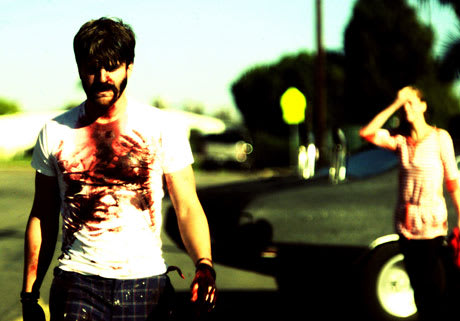Relationship breakdowns can feel like the end of the world. Told through the fuzzy lens of recollection, this is the story of two young adult slackers obsessed with the apocalypse ― more specifically, about looking cool in a post-apocalyptic world.
Woodrow (Evan Glodell) and Aiden (Tyler Dawson) spend their time working on building bombs, a flamethrower and looking for a badass muscle car to convert into a Mad Max-style apocalypse wagon so that their fictional gang, "Mother Medusa," will reign supreme if the end ever does come.
Caught up in their own world, the aimless, shallow buddies have little meaningful interaction with the fairer sex until Woodrow meets Milly (Jessie Wiseman) at a bug eating contest at a bar. The two impulsive thrill seekers hit it off immediately, embarking upon a chaotic love affair destined for disaster. Immersed in a new social circle, Woodrow's relationship with Milly continues to blossom, despite some thinly veiled jealousy from her roommate, Mike (Vincent Grashaw).
How things go wrong is left purposefully vague and presented as selective memory through editing. After a reverse motion intro depicting some of the devastation to come, the first act is mostly linear, with a few omissions saved for later revealing. From somewhere around the midway point though, Bellflower plays with fractured narrative perspective.
This technique is enhanced by the much-ballyhooed homemade camera lenses writer/director/star Evan Glodell used to achieve the picture's unique look. Some of them are dirty and scratched, while others only see specific areas in focus, much like memories. Supporting this unique approach, the camera work is intimate and rough, fitting the story like a glove.
The characters are often short-sighted assholes, as amusing as their shenanigans can be, but their emotional responses feel largely authentic. Woodrow and Milly's courtship is sweet in its immature, borderline nihilistic way, making the mounting tension of their implosion all the more gut wrenching.
The ending will confuse some ― it can be read multiple ways ― but the divide between reality and fantasy is clear enough. Beneath the moments of psychotic behaviour and preoccupation with perceptions of cool is an affective portrait of the world-shattering emotions at play in the game of love.
(Kinosmith)Woodrow (Evan Glodell) and Aiden (Tyler Dawson) spend their time working on building bombs, a flamethrower and looking for a badass muscle car to convert into a Mad Max-style apocalypse wagon so that their fictional gang, "Mother Medusa," will reign supreme if the end ever does come.
Caught up in their own world, the aimless, shallow buddies have little meaningful interaction with the fairer sex until Woodrow meets Milly (Jessie Wiseman) at a bug eating contest at a bar. The two impulsive thrill seekers hit it off immediately, embarking upon a chaotic love affair destined for disaster. Immersed in a new social circle, Woodrow's relationship with Milly continues to blossom, despite some thinly veiled jealousy from her roommate, Mike (Vincent Grashaw).
How things go wrong is left purposefully vague and presented as selective memory through editing. After a reverse motion intro depicting some of the devastation to come, the first act is mostly linear, with a few omissions saved for later revealing. From somewhere around the midway point though, Bellflower plays with fractured narrative perspective.
This technique is enhanced by the much-ballyhooed homemade camera lenses writer/director/star Evan Glodell used to achieve the picture's unique look. Some of them are dirty and scratched, while others only see specific areas in focus, much like memories. Supporting this unique approach, the camera work is intimate and rough, fitting the story like a glove.
The characters are often short-sighted assholes, as amusing as their shenanigans can be, but their emotional responses feel largely authentic. Woodrow and Milly's courtship is sweet in its immature, borderline nihilistic way, making the mounting tension of their implosion all the more gut wrenching.
The ending will confuse some ― it can be read multiple ways ― but the divide between reality and fantasy is clear enough. Beneath the moments of psychotic behaviour and preoccupation with perceptions of cool is an affective portrait of the world-shattering emotions at play in the game of love.




